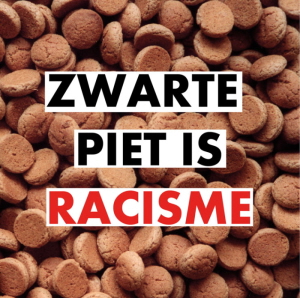The Golden Coach and Dutch Cultural Relativism

Last year Doorbraak activist Jennifer van Leijen initiated a campaign to stop the Dutch government from subsidizing blackface (Zwarte Piet or Black Pete) on children’s television. More than 10.000 people already signed. Van Leijen regularly writes updates. Here is number 12 (also read numbers 1, 2, 3, 4, 5, 6/7, 8, 9, 10 and 11).
When the actor and comedian Russel Brand was first confronted with the Dutch blackface tradition he said: “In this country we think of Holland as a very advanced nation with advanced social principles, so it’s very surprising to see this kind of tradition.” The Netherlands markets itself as being a tolerant nation, and the Dutch believe their own marketing too. The Netherlands even has a human rights ambassador in the Dutch Foreign Office- because the Dutch government feel entitled to (sanctimoniously) lecture the rest of the world as if they, themselves, are beyond reproof. To quote from their own human rights policy document, Justice and Respect for All: “The Netherlands rejects cultural relativism. We call countries to account on the basis of obligations by which states have agreed to be bound, not on the basis of any feeling of moral superiority.”
Erik van Muiswinkel, an actor that once acted in blackface, recently admitted that he had thought that blackface didn’t apply to the Dutch experience; that somehow the blacking-up done in Dutch society was innocent. But it began to dawn on Van Muiswinkel that “if it looks like a duck, walks like a duck, and quacks like a duck, …” (it is a duck, that is: blackface).
The Dutch government need to take their own advice and not claim moral superiority, or cultural relativism. At grass roots level and without further ado some schools have rejected the blackface-element. But it seems that it’s the Dutch establishment themselves, local and national government, the police, and media that are clinging on to the tradition and promoting it. Out of habit and ignorance schools still air the blackface children’s television programme (subsidised by the government). Even the Dutch royal family have been seen celebrating the blackface tradition.
The transatlantic slave trade substantially contributed to wealth in the Netherlands. But this fact isn’t mentioned. It’s why that period in history is generally known as the “Golden Age”. Giving a despicable period of history a positive title exposes the problem the Netherlands has in acknowledging it’s participation in the slave trade. We wouldn’t call the World War II nazi-years “good”. Similarly, the Dutch should treat slavery as a crime towards humanity, and acknowledge that their involvement in the slave trade has tainted it’s history.
The Dutch royal family continue to use a carriage (drawn by horses), called the “Golden Coach”, and the royal family use this coach for important occasions such as weddings. This coach, however, depicts enslaved people in a way that glorifies the slave trade. Timothy W. Ryback, director of the Institute for Historical Justice and Reconciliation at EUROCLIO in The Hague, wrote in an article last year: “The Golden Coach, which dates to 1898, has on its left flank a triptych painted by the decorative artist Nicolaas van der Waay, called ‘Homage from the Colonies’. The two outer panels show half-naked black men shouldering massive bales and satchels. The central image is of a statuesque woman seated on a throne, with two black figures in supplication before her. One kneels in reverence, hands clasped and head bowed as if in prayer. The other prostrates himself, back bent, head lowered, with his right arm outstretched over clusters of bananas and other produce offered as homage to the allegorical queen. It is an appalling sight.”
Please listen to the video where Washington Post journalist Karen Attiah explains why “the Holiday Blackface has got to go!”
Jennifer van Leijen
